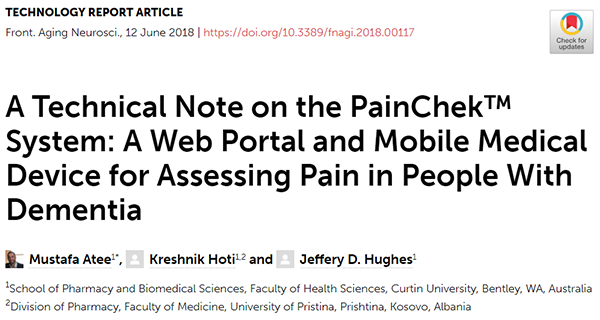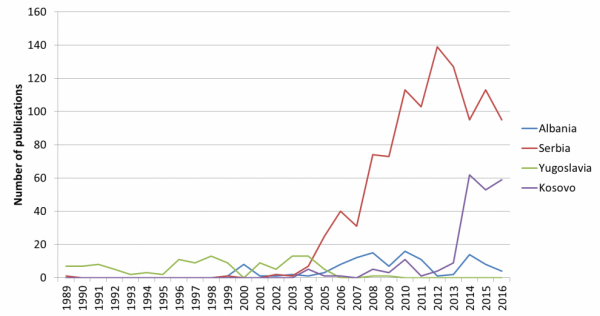The governmental status of the geographical area of Kosovo has been subject to intense conflict during the last decades, and remains rather unclear. Not only does its status differ according the views of the involved governmental entities like Serbia, Albania, Kosovo, the European Union, and the United Nations, but also according to different groups amongst the inhabitants of Kosovo, identifying themselves mainly either as Albanians or Serbians.
The formal identity of the Kosovo region as an independent country or as a province of Serbia is looked upon differently: Serbia, as well as some European Union countries, do not recognize Kosovo’s independence, while other countries within the European Union do recognize Kosovo as an independent nation. Kosovo is not a member state of the United Nations.
Address affiliations in scientific publications show us how scientists from Kosovo define their country. Interestingly, some scientists from Kosovo do not define their country as either Kosovo or Serbia, but they report their country as Albania in their publications. The publication shown below provides an example. This is a recent publication in which one of the authors reports the affiliation ‘Division of Pharmacy, Faculty of Medicine, University of Pristina, Prishtina, Kosovo, Albania’. Hence, in this case Kosovo is seen as a part of Albania.

In the Web of Science the numbers of country definitions for the Kosovo city of Prishtina can be identified with the following search queries:
# 5 784 (#4 not (#1 or #2 or #3))
Indexes=SCI-EXPANDED, SSCI, A&HCI, ESCI Timespan=All years
# 4 1,121 ADDRESS: (((pristina or prishtina or pristhina) same kosovo))
Indexes=SCI-EXPANDED, SSCI, A&HCI, ESCI Timespan=All years
# 3 208 ADDRESS: (((pristina or prishtina or pristhina) same (yugoslavia or yougoslavia)))
Indexes=SCI-EXPANDED, SSCI, A&HCI, ESCI Timespan=All years
# 2 1,319 ADDRESS: (((pristina or prishtina or pristhina) same serbia))
Indexes=SCI-EXPANDED, SSCI, A&HCI, ESCI Timespan=All years
# 1 129 ADDRESS: (((pristina or prishtina or pristhina) same albania))
Indexes=SCI-EXPANDED, SSCI, A&HCI, ESCI Timespan=All years
Note: set #5 has been created as a subset of set #4 to exclude addresses in which Kosovo is presented as a part of Yugoslavia, Serbia, or Albania.
As can be seen in the above statistics, Kosovo is typically seen either as an independent country or as a part of Serbia, but it is also sometimes seen as a part of Albania.
When we zoom in on the country definitions for Prishtina over the years, we find that before 1989 only Yugoslavia was mentioned. From then onwards multiple definitions start co-existing:

Note: In the case of Kosovo, publications in which Kosovo is presented as a part of Yugoslavia, Serbia, or Albania are excluded (consistent with set #5 above).
The large share of Serbia as country definition may be remarkable, since Prishtina is not being controlled by the Serbian government. The Albania definition seems to be somewhat declining after its top popularity in the year 2010, but it is still being used in some publications. A similar situation of inconsistencies in country definitions may occur in affiliations for other disputed areas in the world. The Web of Science easily reveals these cases.
What do we learn from this? It is well known that homonyms and synonyms in author names cause difficulties in identifying the publication oeuvre of a researcher in a database such as the Web of Science. Identifying the publication oeuvre of an entire research institution can be even more challenging, for instance because the name of an institution is not reported in a consistent way in different publications. One might expect countries to be well-defined entities for which publications can be identified without any difficulty. However, the above analysis shows that this is not always the case. Even at the country level, there may be substantial ambiguity, as illustrated by the above case of Kosovo. It is therefore essential to be aware that even country-level bibliometric statistics may be affected by ambiguities in the definition of the unit of analysis.
After working at CWTS for over 20 years, our colleague Bert van der Wurff retired in July 2018. Bert’s detailed knowledge of the Web of Science database, as illustrated in this blog post, has been of great value to CWTS. We thank Bert for his contribution to numerous bibliometric analyses carried out by CWTS and, above all, for being a very nice and helpful colleague.

